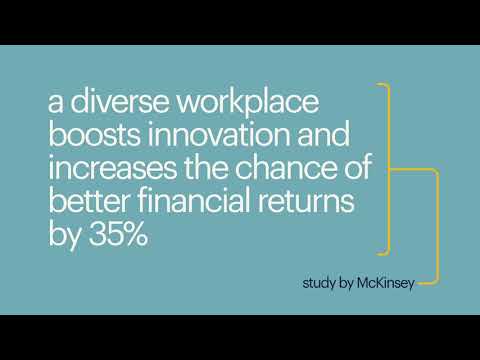temporary staffing
Companies worldwide are transforming their staffing practices to meet the evolving challenges of today’s global economy. HR leaders and hiring managers are optimising talent acquisition using temporary staffing solutions.
Our 2022 Talent Trends research shows the challenges companies face in this volatile market. Only 45% of global human capital leaders feel talent acquisition is about creating value. And with a talent shortage and increased acquisition costs, there’s a real need for future-proofing in an organisation’s workforce.
The ideal staffing solution includes a balance of permanent hires and temporary workers. Working with an HR services firm to optimise the use of internal resources can help.
Here you can find everything you need to re-think your strategy, including flexible and temporary staffing and how this can contribute to your company’s success.
download page as PDFwhat is temporary staffing?
Temporary staffing is a strategy by which companies employ contingent workers. HR teams and other departments use a contingent, or temporary, workforce to meet evolving business and operational challenges as an alternative to hiring permanent employees.
Contingent workers are not on a company’s payroll – they are contractors, independent freelancers, gig workers and agency-provided workers.
Companies use flexible and temporary staffing for a variety of reasons, such as:
- filling a temporary talent gap, such as when a permanent employee is on maternity leave
- meeting a temporary surge in labour demand (e.g. seasonal work)
- trialling temporary workers as potential permanent hires
- supporting one’s small business in lieu of costly, full-time hires
- accessing top talent among workers that prefer to have a flexible schedule, such as parents and students
As well as being a cost-efficient contribution to the long-term success of your business, there are other reasons why a temporary staffing strategy could be right for you
why do you need a temporary staffing strategy?
There are many reasons why you should consider a temporary staffing strategy for your business. Preparing one now gives your workforce the resiliency it needs to take on the unpredictable challenges of the future – without the time, effort and costs associated with hiring new employees.
Thanks to the gig economy (defined as short-term work and temporary positions) and the availability provided by remote work, a greater number of capable professionals are accessible for work.
You too can take advantage of contingent workers, each with their own unique expertise, advantages and personal goals.
staffing solutions in the modern world
Identifying and acquiring the right talent remains one of the biggest challenges in modern business, particularly within the past two years when the pandemic greatly impacted the labour market and saw employees leaving permanent roles.
According to research by PwC, 85% of businesses either have or expect to have shortages in key skills within the next five years. And, due to the accelerating digital transformation, the types of skills needed by companies have changed enormously, with technological processes becoming more widespread than ever before.
Hiring a permanent employee is a considerable commitment in terms of finances, productivity, and time; companies lose money and suffer lower efficiency while positions remain unfilled. As the global business climate becomes even more unpredictable, skills gaps caused by major disruptions and lost employees can be crippling.
"Most organisations will need to adapt their strategies and build new capabilities to be more responsive to changing conditions on the ground,” McKinsey said in their Q4 2020 analysis of the temporary labour sourcing industry.
Workforce capability needs, technological trends, corporate resilience, and innovation and growth are now the specific areas high on the agenda for businesses, according to McKinsey’s latest post-pandemic board report.
The use of temporary workers has fuelled countless companies’ economic recovery following the disruptions of COVID-19 and beyond. As companies automate tasks once completed by skilled workers – and release those employees from full-time employment – others can tap into this talent availability and train them on new technological processes.
Leverage temporary staffing to meet the challenges of the post-pandemic world in your business. Learn more about reshaping your HR strategy to thrive in a challenging business environment.
the business opportunities of flexible staffing
When companies need to respond to changing business requirements and crises, temporary staffing solutions can help increase flexibility, optimise costs and accelerate the acquisition of much-needed talent.
With flexible staffing, companies can re-calibrate their workforce to effectively future-proof their business. Some of the lasting benefits to your business include:
- gaining fast, affordable access to specialist skills
- paying only for the talent you need, when you need it
- increasing your edge over competitors who employ rigid staffing strategies
- trialling potential new hires to make sure you choose the right permanent employees
- transitioning your core staff from tedious day-to-day tasks to value-adding activities
- building relationships with workers and temporary staffing agencies without permanent hires
- substituting unsuccessful workers with successful ones
- relieving core staff or temporarily replacing them when they need to take a period of leave
- collaborating with a short-term employment agency that harnesses experience, relationships and in-depth market insights

“One of the advantages of temporary and contract workers is that they can provide companies with greater flexibility in uncertain economic times.”
As agility and workforce transformation grow in importance, employers are more likely to turn to flexible staffing solutions to help their businesses evolve.
With the help of a recruitment agency, you can use temporary staffing solutions to build a flexible and agile team to meet uncertainty.
proven business benefits
Adopting a temporary staffing strategy does more than improve hiring and workforce management. Employing contingent workers as part of a business’ policy builds resiliency and supports longevity. Companies can rely on their contingent staffing programmes to solve new, recurring and ongoing business challenges.
According to Deloitte, contingent workforces have greatly increased but many companies continue to face challenges in their management. However, organisations that include temporary staff in their workforce strategy have often proven themselves well-positioned for the modern challenges of business. They are also likely to be better prepared than competitors to cope with the cyclical labour swings they will face in the future.

“Despite the current challenges, clients still forecast growth in their use of contingent workforces and recognise the need to better leverage technology to improve sourcing of talent, management of evolving compliance and gain better data and visibility over their workforces.”
embracing remote work
“Workplace teams increasingly demonstrated that they do not need the rigid structure of the traditional 9 to 5 hours in the office to deliver results,” SIA described in 2020. “The near-overnight shift to home or flexible working presented employers with new evidence that remote and contingent workforces can be hugely valuable to their business.”
The world has awakened to the benefits and advantages of remote work – not least of which is the elimination of geographical barriers to talent acquisition. The latest statistics from the ONS show that the most common pattern of hybrid working is for individuals to spend the majority of their working hours at home. Alongside this, the study also shows that the overall number of workers in a hybrid position increased during the first half of 2022.
Temporary staffing strategies that take advantage of remote work enable companies to reach the right talent, no matter their workers’ locations. 81% of US companies leveraged temporary remote workers during the COVID-19 pandemic as the temporary labour market adjusted alongside other industries, McKinsey reported.
With remote working set to continue, “contactless recruiting”, where candidates are not screened in person, will also become commonplace, meaning companies will need to adapt their recruiting, interviewing, hiring and onboarding practices. While this can be a challenging task, temporary staffing means companies needn’t invest as much in traditional approaches to recruiting.
Temporary staffing agencies conduct much of the “heavy lifting” in acquiring the right talent, so there isn’t the need for companies to greatly invest in remote-talent acquisition techniques themselves.
How can your business effectively manage a remote workforce? Read the most common mistakes of managing a remote team.
Senior leaders can quickly upscale or downscale their flexible staffing investments in real-time as business opportunities and demands evolve. They can also simplify their management of HR resources, visualising temporary staffing solutions as a single cost centre.
As business leaders’ relationships with contingent workers and HR services companies develop, they can cultivate a robust and well-managed talent community to support a variety of resourcing needs. However, collaboration is key and both parties need to be invested in the HR-partner relationship.
With a successful HR-partner relationship, a business can build familiarity within their talent pool without the need to hire employees directly.
Can your workforce meet the challenges of our modern world? Discover six activities to future-proof your workforce.
how to build your temporary staffing strategy
Now that you recognise contingent workers as an important asset in modern business, you can develop your own temporary staffing solutions to leverage the benefits.
Begin by identifying your needs and create an internal team to review flexible staffing opportunities across your company. Identify where your skills gaps are, which roles can be filled with contingent workers and which should remain permanent. You should also consider whether transitioning existing employees to a temporary work agency’s payroll makes sense.
Although you may only need flexible staffing for a single department, role or process today, the relationships you build can contribute to the wider needs of your company in the future.
how to get started with temporary staffing
Traditional hiring calls upon company stakeholders to identify, invest in and build formal relationships with individual employees. With temporary staffing, the focus of the relationship shifts to a talent pool that could include several freelancers and contractors. This pool may also consist of temporary recruitment agencies with a vetted selection of workers.
In this way, companies can approach temporary staffing relationships as a complete business solution, rather than tackling specific roles on an individual basis. The key questions a business should be asking are:
- How can flexible staffing help us fulfil the immediate talent needs of our company?
- How can temporary staffing contribute to our long-term business goals?
- How can temporary staffing solutions help us reach talent we couldn’t reach otherwise?
- Which tasks are the right ones for contingent or permanent workers, both now and in the future?
- Which tasks can we outsource to increase the value of our employees’ labour?
- To whom should we turn for temporary workers – freelancers, a temp staffing agency or others?
- What are the legal, financial and HR requirements of maintaining a contingent workforce?
- How will we successfully manage ongoing relationships with contingent workers and staffing companies?
Even among companies prioritising permanent hires, a temporary staffing strategy protects against potentially disruptive talent shortages. Creating temporary staffing solutions is both about fulfilling specific talent needs and protecting a company’s future.
attracting and retaining contingent talent
Companies need to improve how they attract and retain contingent talent as it becomes more important to them. HR leaders will need to familiarise themselves with their temporary workers’ unique needs.
Although companies approach temporary staffing as a business solution, it’s important to remember they are engaging a community of talented individuals seeking roles that will help them fulfil their own professional goals.
why do workers choose flexible roles?
Workers might choose to become temporary or contingent for a variety of reasons. For example, contingent work offers continuity for skilled professionals who have been laid off. It can also provide talented graduates with professional experience at the start of their careers.
Temporary workers often seek out benefits in a company such as:
- opportunities to build relevant professional experience
- exposure to training and other staff benefits
- pathways to permanent positions
- referrals and recommendations from supervisors
- association with recognisable industry brands
- trying out different jobs to decide what they want in a career
- more time to travel, attend school, raise children or care for family members
It’s sometimes difficult for a company to determine which talent is right for them, and how each worker’s motivations align with their own company goals. Take a look at our key steps and practical considerations for getting the most out of your contingent workforce.
Temporary recruitment agencies can also help you get started as you develop your understanding of the flexible staffing market and begin to build your brand among contingent workers.
building your contingent talent brand
You may or may not build long-term relationships with individual contingent workers, but you will develop your own “contingent talent brand” based on the experiences and opportunities your company provides. As market demand for contingent talent grows, you should work on your brand to attract and retain temporary workers.
Your internal team can optimise engagement with temporary staff and build a talent community with the personal goals of temporary workers in mind:
- attracting contingent talent: You’ll need to consider your employee value proposition and the needs of your flexible workforce, for example, advertising training or growth opportunities as part of your contingent roles. Your brand should demonstrate that value is critical when attracting contingent staff.
- retaining contingent talent: Nurturing your temporary staff is key to ensuring they are open to future assignments. For example, make contingent workers’ professional development a strategic part of your initiative and take time to understand their preferences, adapting your strategy accordingly.
Remember that flexible staffing is not just a means to an end and some industries are more unique than others in terms of what contingent workers typically look for in a company. A broad, common-sense approach that prioritises the well-being and development of temporary workers is essential for long-term success.
How can you attract and retain your temporary workers? Read our three key considerations to engaging contingent talent.
choosing to work with a temporary staffing company
For decades, staffing companies have helped companies fill labour shortages and even build relationships with successful full-time hires. Today’s temporary staff recruitment agencies have evolved to meet the modern needs of businesses with critical capabilities such as:
- connecting companies with talented workers, quickly and efficiently
- interviewing and vetting talent to the benefit of companies seeking them
- fulfilling formal requirements for recruitment process outsourcing (RPO)
- nurturing a tight-knit community of enthusiastic and capable workers
- optimising staffing best practices for remote and hybrid work environments
- scaling up staffing efforts while helping businesses plan their workforce efficiently
Staffing companies have only grown in importance as economic uncertainties drive new business and labour requirements, with an emphasis on value, professionalism and technology. Whether a company is downsizing or acquiring talent to take on new business challenges, short-term employment agencies can help.
what is a staffing company?
Staffing companies consist of consultants who have built close relationships and deep expertise across specific labour markets and industries. At a basic level, they match companies with suitable employees, connecting organisations with workers who fit their needs.
Larger temp staffing agencies can span multiple sectors, often cultivating expertise from across the board to become a more holistic talent solution for their partners.
Companies rely on temporary staffing agencies to remain proficient in labour and talent acquisition best practices, especially as markets become more challenging and complex. The right staffing company is a strategic solution to its partners, but it can also be a collaborator and advisor, providing market insights to the talented professionals it serves.
How can your business benefit from a temp staffing agency? Read more about the benefits of working with an HR services and resources partner
why choose a temporary staffing agency?
Companies often attempt to manage flexible and temporary workers themselves by partnering with freelancers directly. This can be sufficient for short-term needs and in small volumes, but these relationships are often tenuous and difficult to cultivate and maintain as they scale.
Staffing companies have the knowledge and expertise to become a strategic solution for recruiting and managing a company’s contingent workforce on their behalf. Partnerships with temporary staffing agencies therefore add strategic and operational value, whereas individually managed relationships do not.
Partnering with a temporary recruitment agency can also help a business save costs and time, as well as limit the risks of hiring a new employee. It’s also beneficial for a company to choose just one temp staffing agency, with a focus on quality rather than quantity.
working with Randstad
Randstad is the world leader in the HR services industry. With over 60 years of experience, our close professional relationships and expertise span multiple continents and industries. We provide unique and localised solutions to meet any company’s temporary staffing needs on both small and large scales. Our partners enjoy:
- flexible access to millions of candidates
- high-tech and people-powered solutions
- a deep understanding of the industry’s latest best practices and trends
- a global presence, providing over 600,000 workers with employment every day
When you choose to work with Randstad, you can take advantage of our HR tech tools including video interviewing, automated reference checking and more to digitise key parts of your HR process. Or, if you prefer, Randstad can manage your entire recruitment process end-to-end.
If you feel it’s time to begin building a flexible team to meet future uncertainty with the right talent assets at hand, contact us today. We can find staffing solutions in your area or discover the remote-work options available to fit your exact needs.
Learn about what makes Randstad unique and the reasons you should choose us to handle your recruitment needs.
temp staffing agencies FAQs
Traditional staffing involves the hiring of permanent employees. Companies offer them salaries and benefits so they remain part of the business long term. Alternate staffing solutions include partnering with individual freelancers, contractors or vendors and working with staffing companies like Randstad. These methods allow organisations to acquire talent without the need to hire permanent staff.
-
what’s the difference between temporary staffing and permanent recruitment?
Flexible staffing is the use of temporary, contingent workers to fill talent needs within a company. It does not require direct recruitment, hiring, administrative handling and payrolling, which apply to permanent employees. Instead, flexible or temporary staffing involves a third-party partnership – with a temporary recruitment agency, a contractor, a vendor or a freelancer.
-
what are a company’s responsibilities to their contingent workers?
Flexible staffing is the use of temporary, contingent workers to fill talent needs within a company. It does not require direct recruitment, hiring, administrative handling and payrolling, which apply to permanent employees. Instead, flexible or temporary staffing involves a third-party partnership – with a temporary recruitment agency, a contractor, a vendor or a freelancer.
-
what are a company’s responsibilities to their contingent workers?
Unlike employees, most temporary workers do not receive salaries or benefits from the companies for whom they work. If those contingent workers are contractors or freelancers, the company pays them as they would vendors. If the temporary workers represent a staffing agency, companies pay the agency, which pays workers in turn with respect to local laws and wage requirements.
Companies must always provide workers with a safe, equitable and constructive work environment, as they would their permanent employees, and as per the Agency Workers Regulations.
-
how do I decide which type of staffing is right for me?
Whether you choose to partner with a temp staffing agency or work directly with freelancers or contractors yourself, the consultants at Randstad can help. Start a conversation with Randstad to connect with an HR services professional and determine the right staffing solutions for you.
latest updates
-
 28 October 2024
28 October 2024the pros & cons of hiring flexible talent.
-
 21 October 2024
21 October 2024how to organise and adapt your workforce amid constant change.
-
 04 September 2023
04 September 2023is your organisation prepared for the future of work?
-
 10 August 2022
10 August 20228 mistakes to avoid when managing a remote workforce.
-
 02 August 2021
02 August 2021how to engage your contingent workforce - three key considerations.
-
 03 June 2021
03 June 2021how to reshape your HR strategy to survive and thrive.





